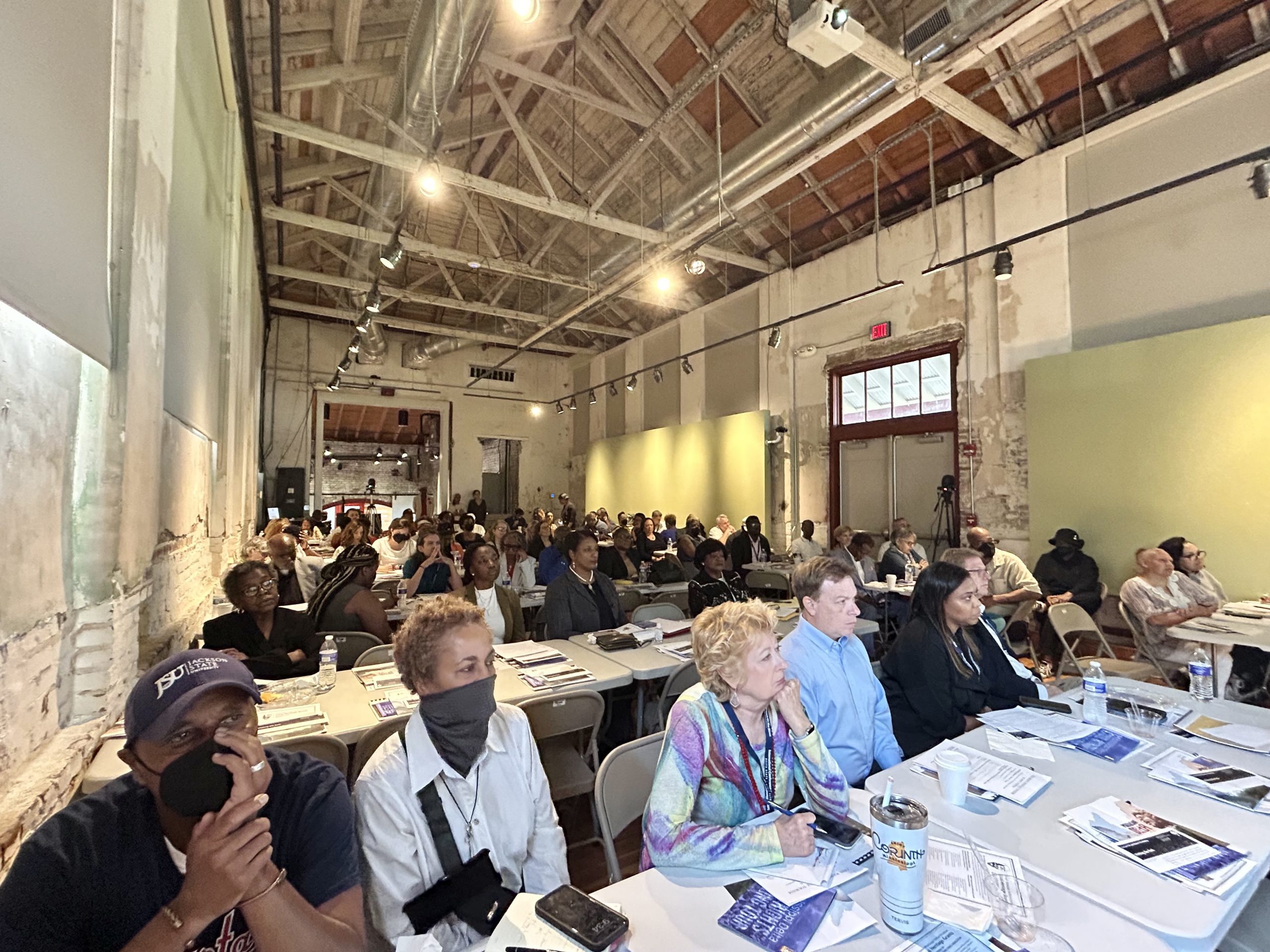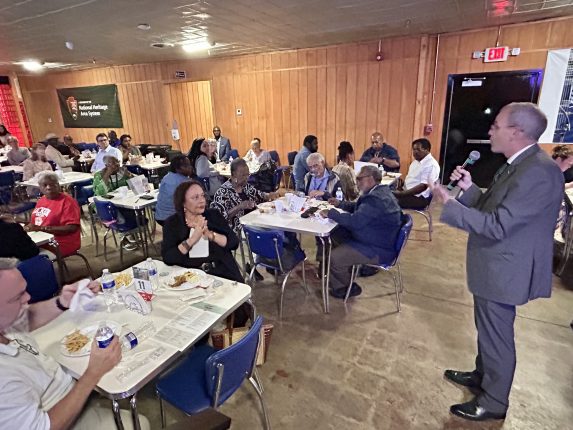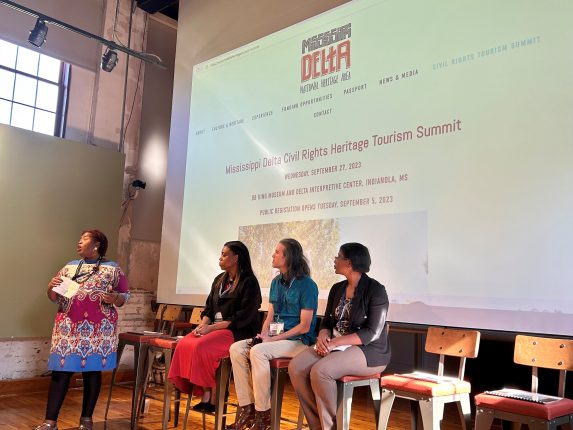 Mississippi Delta residents and visitors attending the Civil Rights Heritage Tourism Summit at the B.B. King Museum in Indianola.
Mississippi Delta residents and visitors attending the Civil Rights Heritage Tourism Summit at the B.B. King Museum in Indianola.
CLEVELAND, Miss. — Recently, over 100 regional and national stakeholders attended the Mississippi Delta region’s first-ever Civil Rights Heritage Tourism Summit at the B.B. King Museum and Delta Interpretive Center in Indianola. The summit was free and open to the public with support from the National Parks Conservation Association in Washington, D.C.
The day-long summit featured a variety of panel discussions and presentations collaboratively organized by the Delta Center for Culture and Learning at Delta State University, the B.B. King Museum, Mississippi Delta National Heritage Area, Mississippi Heritage Trust, Mississippi Humanities Council, Mound Bayou Museum, and the National Park Service.
Summit feedback was overwhelmingly positive with 100% of post-event survey respondents rating the event as “Excellent” or “Good” overall, and 97% indicating that the Summit addressed relevant topics for improving Civil Rights tourism development in the Mississippi Delta. Video footage from the Summit is available at www.msdeltaheritage.com/cr-summit.
“Local and national interest in Mississippi Delta Civil Rights heritage tourism has continued to grow over the years,” said Dr. Rolando Herts, Director of the Delta Center and Executive Director of the Mississippi Delta National Heritage Area. “The positive feedback that we have received from community stakeholders about the summit suggests that our communities need more networking and information sharing opportunities like this.”

Dr. Dan Ennis, President of Delta State University, speaking at historic Club Ebony.
“I am proud of Delta State University’s role in the Mississippi Delta Civil Rights Heritage Tourism Summit,” said Dr. Dan Ennis, President of Delta State University, who gave remarks at the event. “Through the connective work being done by the Delta Center, we are able to stay in touch with the leaders of significant cultural organizations in our region. Not only does this work help preserve our heritage, it supports the economy through tourism as well.”
“We were honored to host this historic event,” said Malika Polk-Lee, Executive Director of the BB King Museum and Delta Interpretive Center. “B.B. King supported the Civil Rights Movement, and that story is told in our museum, making this an ideal place to bring Mississippi Delta residents and visitors together for these conversations.”
The summit opened with remarks from Chris Abbett, Associate Regional Director for Partnerships, Lands, Interpretation and Planning with the National Park Service; Kim Terrell, Vice Chair of the Mississippi Delta National Heritage Area Board of Directors; and Herts, who facilitated summit sessions throughout the day.
“In partnership with the National Park Service, National Heritage Areas collaborate with local communities to tell nationally important stories,” said Abbett. “With the recent designation of the Emmett Till and Mamie Till-Mobley National Monument in the Mississippi Delta, Civil Rights heritage tourism is front and center. Hats off to all the summit partners for bringing communities together to have these important conversations. The National Park Service looks forward to working with the Mississippi Delta National Heritage Area and partners throughout the Delta to tell these important Civil Rights stories.”
“The work the MS Delta NHA has done and continues to do is so important to the Delta as well as many parts of the nation,” said Terrell. “We have had people coming from all over the U.S. to participate and learn from events like this summit.”

Keena Graham of the National Park Service (left) moderating the Interpreting Civil Rights Heritage panel.
The morning sessions featured conversations about connections between blues and Civil Rights tourism, interpreting Civil Rights heritage, and engaging Civil Rights storytellers from Mississippi Delta communities with special guest Charles McLaurin, an esteemed veteran of the Civil Rights Movement representing We2Gether Creating Change in Drew.
Afternoon sessions focused on tourism marketing/promotion and funding opportunities with representatives from the Mississippi Arts Commission and the W.K. Kellogg Foundation. There was a special segment about Dr. Felicia King, owner of the Indianola Freedom House, working with Lolly Rash, executive director of Mississippi Heritage Trust to preserve the house. There also was a presentation about how communities can apply for a Mississippi Freedom Trail Marker through the Mississippi Humanities Council.
“The Mississippi Freedom Trail was established to preserve and commemorate Civil Rights heritage stories throughout the state,” said John Spann, Program & Outreach Officer for the Mississippi Humanities Council. “The summit provided an excellent opportunity for us to share information about how Delta-based organizations can apply to get a Freedom Trail Marker in their communities.”
“The Tourism Summit was such a great way to showcase the importance of cultural tourism in the MS Delta. Also, it highlighted several entrepreneurial opportunities that exist,” said Abe Hudson, Mississippi & Arkansas Delta Program Officer with the Walton Family Foundation. “It was great to see so many funders in the room discussing ways for people and businesses to get in the game of tourism.”
The evening session featured dinner at Club Ebony with a screening of the film “Promised Land: A Story About Mound Bayou” followed by a panel discussion facilitated by Kendra Fipps Crowe from the Mound Bayou Museum. Panelists included museum co-founders Reverend Darryl Johnson, Hermon Johnson, Sr., Hermon Johnson, Jr., and former Mound Bayou mayor Dr. Eulah Peterson.
“Mound Bayou is the oldest Black town in the United States with critical connections to the stories of Civil Rights icons like Emmett Till, Mamie Till-Mobley, and Medgar and Myrlie Evers,” said Hermon Johnson, Jr., director of the Mound Bayou Museum. “The summit provided a great opportunity for us to educate the public about these connections.”
Post-event survey respondents indicated that they would like to see the summit happen annually.
“It was an honor to serve on the engaging community storytellers panel with Civil Rights foot soldier Charles McLaurin and others,” said Keith Johnson, a Delta-born blues musician and great nephew of legendary bluesman Muddy Waters. “When the audience was asked if they would like to see the summit happen again next year, so many hands went up around the room. That response alone points to a need for this summit to continue.”
For more information about the Delta Center for Culture and Learning and the Mississippi Delta visit their website at https://deltacenterdsu.com/. For mor information about the National Heritage Area, visit their website at https://www.msdeltaheritage.com/.

